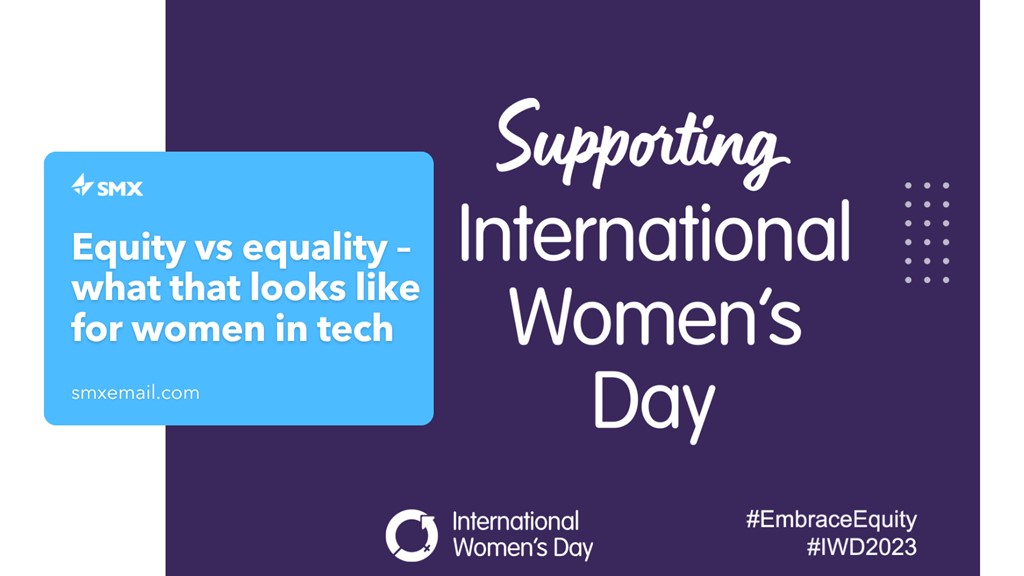Equity vs equality – what that looks like for women in tech

This International Women’s Day, we’re focussing on the position of women in STEM industries – we acknowledge that other groups are also poorly represented and face huge challenges in our industry.
In 1969, Apollo 11 landed on the moon, guided by a control room of all men, except for JoAnn H. Morgan – NASA’s first women engineer. It would be nice to think that her pioneering presence in the room opened the door to a flood of women technicians, but half a century later women make up only one third of the staff, and only 16 percent of senior scientific employees.
That’s a stat we see across the STEM industries – only 28% of STEM workers are women.
We know women can do these jobs, and that diversity improves innovation and profitability. So, why are the numbers still so imbalanced?
Where are the women?
Even if it seems like women have equal access to opportunities in the workplace, it’s simply not true. Here are just some of the ways society norms are making things harder for women.
- Women do far more unpaid labour – In an ideal world, people would make equal contributions to their home life, but that’s not the case yet. Statistically, women still do the lion’s share of the home and childcare labour. They are the ones remembering birthdays, buying Christmas gifts for extended family, and fielding phone calls from daycare.
- Women face more gender discrimination at work – One study found that 91% of women said gender discrimination was a career obstacle and 73% said sexual harassment was another. Another study from Pew Research found that 48% of women in STEM jobs who work with mostly men say their gender has made it harder for them to succeed in their job.
- Fewer women believe they’re up to the intellectual challenge – More women will underestimate their mathematical abilities and girls as young as six will begin to rate boys’ intelligence as higher than girls.
What the STEM industry needs is equity – acknowledging that even if law and business policy insist on equal treatment for women, an unequal society means women can’t take advantage of it.
What does equity for women look like for the STEM industry?
Talk to any employer in science or technology, and they’ll all say they wish they had more women in their teams. SMX is no different – just 17% of our staff and none of our engineers are women. That’s something we’re actively working to solve – but just wanting to recruit women isn’t enough. We have to tackle this issue from multiple angles.
Here’s what it’ll take.
Supporting girls and young women to study
More women in STEM jobs means more women studying it in the first place. There are already great organisations and role models working to inspire girls and young women – if you’re serious about changing the moving the dial on women’s representation, start there.
Shadowtech arranges for girls in their final years of high school to see what working in the tech sector could be like and SheSharp connects women in STEM industries through events, workshops, and networking opportunities. Similarly, Tech Women inspire girls into tech roles, help grow their careers and shape policy to improve diversity in the tech workplace.
Business operational changes that make it easier for women to succeed
Until society shifts, we’ve got to accept that women face more challenges than men – what can workplaces do to even things up a bit?
Juggling work, childcare and home is still a struggle for women – research from LinkedIn found that over half of women have left or considered leaving their current role because of a lack of flexibility. In an ideal world, parents would be involved with their children equally, but we know from experience this is not the case.
Tackling unconscious bias and discrimination is tougher – that takes a culture-wide shift. A good starting point: targeted training and development for women, pay parity and flexible work.
Removing the bias from recruiting
There’s plenty of research to show what you can do to get more women candidates to apply for job – and it’s not actually all that hard.
- Soften the application criteria – research tells us women typically apply only for roles were they meet all the criteria, while men will typically apply if they meet only 60%.
- Be open about salaries – this shows you’re committed to fair pay.
- Promote your flexible work policies – one report from LinkedIn found these were most popular among women.
- Weed out gender-skewing language – The same report showed that language “Ninga”, “rockstar” and “aggressive” would discourage women applicants.
It’s something we’re actively working into our recruitment process…
Let’s get equitable
We hope you’ll join us in taking this International Women’s Day as a call to action.
Businesses and clients would be better off with more women in our workforce – and there are a bunch of concrete steps we can take to get there. All of them start with making our workplace not just equal, but equitable.
International Women's Day (March 8) is a global day celebrating the social, economic, cultural, and political achievements of women aimed at accelerating women's equality. This year’s theme is #EmbraceEquity.